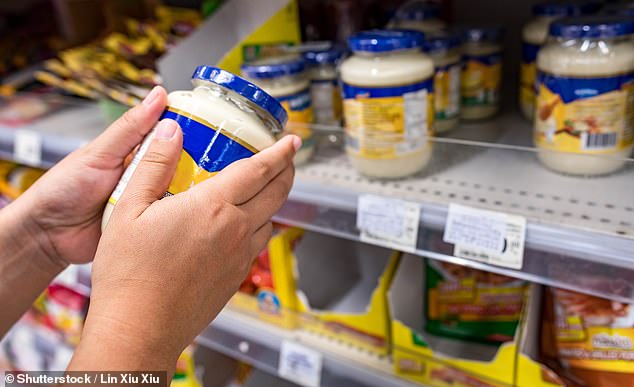Dr. Darin Detwiler, a food safety expert at Northeastern University in Boston and former food safety advisor to the FDA and USDA, shared tips for storing condiments like mayonnaise.
Food safety experts are warning Americans not to keep condiments like mayonnaise, pesto and barbecue sauce in the pantry following an international outbreak of deadly bacteria.
Earlier this month, health officials in Saudi Arabia raised the alarm after 75 people fell ill with botulism. to rare foodborne pathogen that attacks the body’s nerves.
Of these cases, 11 were hospitalized and 20 required intensive care monitoring. One individual died.
The Saudi Food and Drug Authority (SFDA) discovered that the toxin that causes botulism, Clostridium Botulinum, was found in mayonnaise sold at the Hamburgini chain in the capital Riyadh.
Dr. Darin Detwiler, a former FDA and USDA advisor and food safety expert at Northeastern University in Boston, told DailyMail.com that while botulism is rare in the US, “the severity is high “, which makes proper storage of condiments essential.
“Condiments, including mayonnaise, can be at risk if not handled or stored properly,” he said.

Mayonnaise is an egg-based condiment, which leaves it vulnerable to bacteria such as C botulinum and salmonella if not stored properly (file image)


Claudia Albuquerque Celada (left) and Doralice Goes (right) suffered botulism and were paralyzed after eating contaminated food.
Botulism is caused by a toxin released by the bacteria Clostridium botulinum, which is normally found in mostly harmless spores in soil, marine areas, and on the surface of foods such as fruits, vegetables, and seafood.
These bacteria produce spores, which act as protective coatings, which are usually harmless.
However, tight, warm, humid spaces that lack oxygen, such as plastic jars and cans, can cause bacteria to release toxins that attack the central nervous system.
The CDC estimates that there are only 200 cases of botulism in the United States each year, and only 25 are due to food, making it increasingly rare.
It is unclear what other ingredients were in the contaminated mayonnaise and whether the eggs were pasteurized, meaning they were heated to high temperatures to kill bacteria such as C botulinum.
Dr. Detwiler notes that when it comes to botulism, “it’s usually the eggs that are responsible.”
“Botulism thrives in anaerobic (oxygen-free) environments,” he said.
“Poorly sealed containers or poorly stored mayonnaise can create favorable conditions for the growth of Clostridium botulinum.”
Cooking eggs kills this bacteria, but condiments like mayonnaise, aioli, and hollandaise sauce contain raw eggs. This means they could still harbor harmful pathogens.
Dr. Detwiler noted that the risk is greatest for homemade mayonnaise, as it is more likely to contain unpasteurized eggs.
“However, commercial mayonnaise often contains pasteurized eggs, which reduces this risk,” he said.
To counteract this risk, Dr. Detwiler urges “always refrigerate mayonnaise after opening,” although unopened condiments can be stored in the pantry in a cool, dry place, away from sunlight.
Keeping condiments like these at room temperature for long periods of time allows bacteria to grow more, so storing them in the refrigerator stops that growth.
And if you’re making mayonnaise from scratch, it suggests using it within a few days, and the FDA recommends throwing away perishable foods that have been at room temperature for more than two hours.
In addition to the mayonnaise, Dr. Detwiler recommended refrigerating the pesto, since it contains basil and cheese, as well as mustard.
Even barbecue sauce may be at risk because it “contains sugar and other perishable ingredients that benefit from refrigeration.”
Dr. Detwiler also urged consumers to be wary of bulging or leaking containers on shelves, as these “are signs of bacterial activity, possibly including Clostridium botulinum.”
‘Do not consume these products.’
And avoid returning unused portions of mayonnaise and other perishable condiments to their original containers. “This prevents contamination of the entire container,” he said.
Dr. Detwiler warned that signs of botulism include difficulty swallowing, muscle weakness, double vision, drooping eyelids, blurred vision, difficulty speaking, difficulty breathing, and difficulty moving the eyes.
Foodborne infections can also cause vomiting, nausea, stomach pain, and diarrhea.
“Botulism is life-threatening if not treated promptly,” Dr. Detwiler said. “Early diagnosis and treatment are crucial.”


